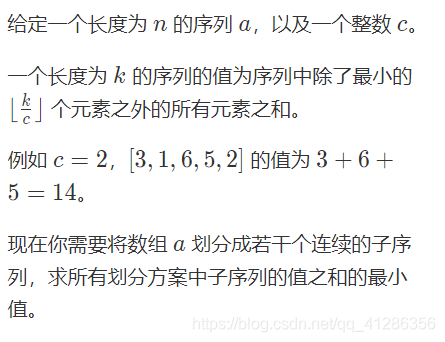Title link
Because of the written test. So it only took two hours to play, a little bit quick, many details were not hurriedly handed in, and there was no inspection.
C-fried steak
Method: The number of all faces is sum = 2 * n and then sum / (2 * k).
ans = max (10, n / k) If there is only one pancake, it will also be fried for 10 minutes, so the minimum is ten minutes
E-card game
Interval dp + memorized search
Let dp [l] [r] be the answer of garlic head Jun minus Hua Yemei when l to r in the interval
#include<bits/stdc++.h>
using namespace std;
typedef long long ll;
const int N=1e2+10;
ll dp[N][N],a[N];
int vis[N][N],n;
ll dfs(int l,int r,int ty)
{
if(l>r) return 0;
if(vis[l][r]) return dp[l][r];
vis[l][r]=1;
ll &ans=dp[l][r];
if(ty==0){
ans=max(dfs(l+1,r,1)+a[l],dfs(l,r-1,1)+a[r]);
}
else{
if(a[l]>=a[r]) ans=dfs(l+1,r,0)-a[l];
else ans=dfs(l,r-1,0)-a[r];
}
return dp[l][r];
}
int main()
{
cin>>n;
for(int i=1;i<=n;++i) cin>>a[i];
ll ans=dfs(1,n,0);
cout<<ans<<endl;
return 0;
}
/*
4
3 2 10 4
ans:7
*/
H-two arrays
Practice: Pei Shu's theorem + derivation
Through Pei Shu's theorem, we know that the adjacent difference in the a array requires the b array to perform the equation conversion.
x1*b[1]+x2*b[2]......xn*b[n]==a[i+1]-a[i]
Also: x1 * b [1] + x2 * b [2] ...... xn * b [n] = k * gcd (x1, x2, x3 ... xn) has a solution
Assuming that the last number in the a array is x
Let d be: d = xa [i]
That is: x1 * b [1] + x2 * b [2] ...... xn * b [n] = d remainder 0 or x1 * b [1] + x2 * b [2] .... ..xn * b [n] = d1 Yu mod ==> d1 + mod = d
So now we need to fill in all the differences. All the differences have the same remainder as the modulus of gcd (x1, x2, x3 ... xn).
#include<bits/stdc++.h>
#define rep(i,a,b) for(int i=a;i<=(b);++i)
#define mem(a,x) memset(a,x,sizeof(a))
#define pb push_back
#define pi pair<int, int>
#define mk make_pair
using namespace std;
typedef long long ll;
ll gcd(ll a,ll b) { return b?gcd(b,a%b):a;}
const int N=1e5+10;
int n,m;
ll a[N],b[N];
int main()
{
int _;cin>>_;while(_--)
{
scanf("%d%d",&n,&m);
rep(i,1,n) scanf("%lld",&a[i]);
rep(i,1,m) scanf("%lld",&b[i]);
if(n==1){puts("Yes");continue;}
ll d=b[1];
rep(i,2,m) d=gcd(d,b[i]);
sort(a+1,a+1+n);
int flag=1;
ll res=(a[2]-a[1])%d;
for(int i=1;i<n&&flag;++i){
ll t=a[i+1]-a[i];
if(t%d!=res) flag=0;
}
if(flag) puts("Yes");
else puts("No");
}
}
/*
4
2 6 10 12
2 3 4 5
*/
I-function summation
Topic:
practice:
Code:
#include<bits/stdc++.h>
#define rep(i,a,b) for(int i=a;i<=(b);++i)
#define mem(a,x) memset(a,x,sizeof(a))
#define pb push_back
#define pi pair<int, int>
#define mk make_pair
using namespace std;
typedef unsigned long long ll;
ll gcd(ll a,ll b) { return b?gcd(b,a%b):a;}
const int N=1e5+10;
const ll mod=998244353;
ll a[N],b[N],c[N];
int n;
bool cmp(ll x,ll y)
{
return x>y;
}
void add(ll &x,ll y)
{
x=(x+y)%mod;
}
int main()
{
scanf("%d",&n);
rep(i,1,n) {
cin>>a[i];
a[i]=1ll*i*(n-i+1)*a[i];
}
rep(i,1,n)cin>>b[i];
sort(a+1,a+1+n);
sort(b+1,b+1+n,cmp);
ll ans=0;
rep(i,1,n) {
ll x=a[i]%mod*b[i]%mod;
add(ans,x);
}
cout<<ans<<endl;
return 0;
}
J-sequence division
Topic:
Official solution:
Note that the subsequence here requires that the subscripts are consecutively grouped together, I think the subscripts are discontinuous, and greedy write wa
If the subscripts are continuous, it is the classic dp. The prefix sum and the interval minimum value can be maintained.
Let dp [i] be the minimum weight sum assigned to the first i elements.
#include<bits/stdc++.h>
#define rep(i,a,b) for(int i=a;i<=(b);++i)
#define mem(a,x) memset(a,x,sizeof(a))
#define pb push_back
#define pi pair<int, int>
#define mk make_pair
using namespace std;
typedef long long ll;
ll gcd(ll a,ll b) { return b?gcd(b,a%b):a;}
const int N=1e5+10;
ll a[N],dp[N],mi[4*N],sum[N];
int n,c;
void build(int id,int l,int r)
{
if(l==r) {
mi[id]=a[l];
return ;
}
int mid=l+r>>1;
build(id<<1,l,mid);
build(id<<1|1,mid+1,r);
mi[id]=min(mi[id<<1],mi[id<<1|1]);
}
ll qu(int id,int l,int r,int ql,int qr)
{
if(ql<=l&&r<=qr) return mi[id];
ll res=1e18;
int mid=l+r>>1;
if(ql<=mid) res=qu(id<<1,l,mid,ql,qr);
if(qr>mid) res=min(res,qu(id<<1|1,mid+1,r,ql,qr));
return res;
}
int main()
{
cin>>n>>c;
rep(i,1,n)
{
scanf("%lld",&a[i]);
sum[i]=sum[i-1]+a[i];
}
for(int i=1;i<c;++i) dp[i]=dp[i-1]+a[i];
build(1,1,n);
for(int i=c;i<=n;++i){
dp[i]=min(dp[i-1]+a[i],dp[i-c]+sum[i]-sum[i-c]-qu(1,1,n,i-c+1,i));
}
cout<<dp[n]<<endl;
}
/*
12 10
1 1 10 10 10 10 10 10 9 10 10 10
*/
By the way, write a group A question.
Group A
E-GCD
Topic:
Practice: Classic Euler function
Group A J all arranged
Topic:
cf original title. .
Original question link E question
Official solution:
#include<bits/stdc++.h>
using namespace std;
typedef long long ll;
const int N=2e5+10;
int p[N],n;
ll a[N],sum[4*N],lazy[4*N],mi[4*N];
void pushdown(int id)
{
if(lazy[id]){
lazy[id<<1]+=lazy[id];
lazy[id<<1|1]+=lazy[id];
mi[id<<1]+=lazy[id];
mi[id<<1|1]+=lazy[id];
lazy[id]=0;
}
}
void up(int id,int l,int r,int ql,int qr,ll val)
{
if(ql<=l&&r<=qr){
lazy[id]+=val;
mi[id]+=val;
return ;
}
pushdown(id);
int mid=l+r>>1;
if(ql<=mid) up(id<<1,l,mid,ql,qr,val);
if(qr>mid) up(id<<1|1,mid+1,r,ql,qr,val);
mi[id]=min(mi[id<<1],mi[id<<1|1]);
}
int main()
{
scanf("%d",&n);
for(int i=1;i<=n;++i){
scanf("%d",&p[i]);
}
for(int i=1;i<=n;++i){
scanf("%d",&a[i]);
}
for(int i=1;i<n;++i){
up(1,1,n,1,p[i],a[i]);
}
if(p[n]+1<=n)up(1,1,n,p[n]+1,n,a[n]);
ll ans=min(a[1],a[n]);
ans=min(ans,mi[1]);
for(int i=n-1;i>1;--i){
if(p[i]+1<=n) up(1,1,n,p[i]+1,n,a[i]);
up(1,1,n,1,p[i],-a[i]);
ans=min(ans,mi[1]);
}
printf("%lld\n",ans);
}












